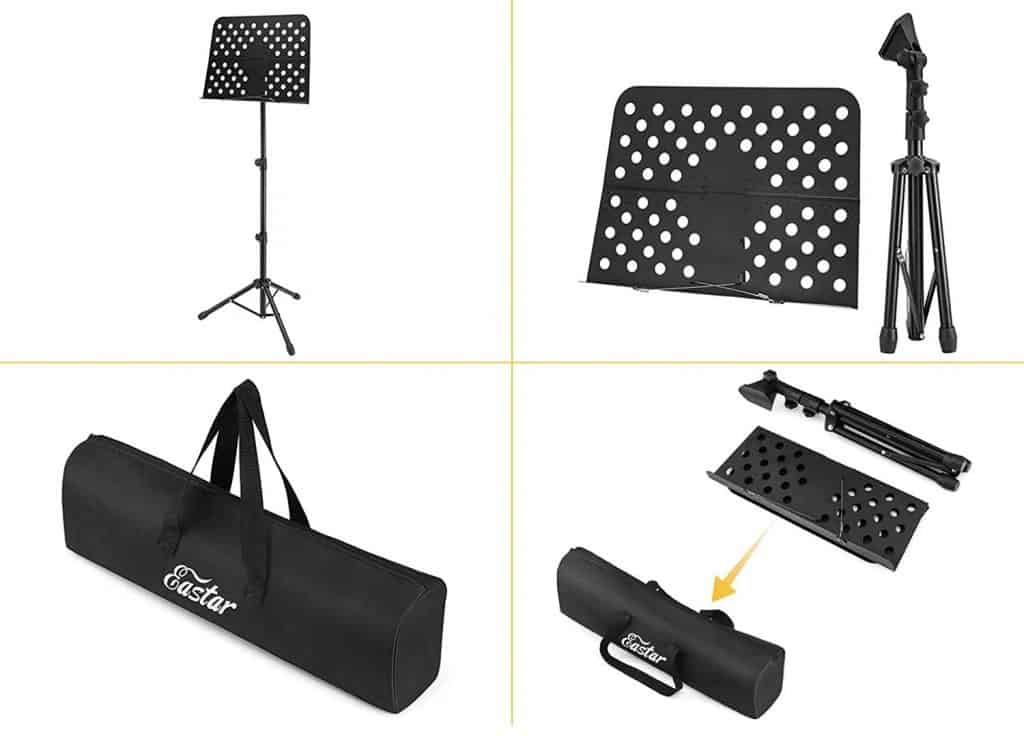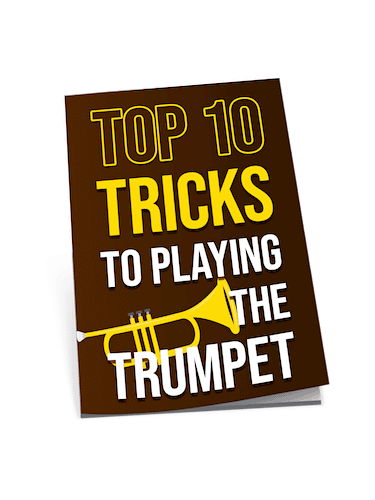Want to start playing the trumpet but feel a bit lost? Check out our **beginner trumpet – top 10 tips** to get you going…
Trumpet players, once they overcome the starter stage, turn out to be obsessed with their instrument. They love learning music, and their plan is to learn Trumpet as quickly as possible.
But what is the simplest way to start?
How will you improve without getting anxious? How will you keep having a great time but nonetheless work hard?
The answer: Creating a strong practice strategy. You definitely were not born with the knowledge of HOW to practice effectively, hence it’s something you’ll need to find out…
So the following is our set of ten best trumpet tips for beginners to help you learn better, more quickly, and stronger. If you like what you read, please do comment at the bottom (and remember to share it with your friends!)
Posture
ONE
The aim is to sit in a way that allows you to get the air down the trumpet in the easiest way possible. I like to imagine two pieces of string, one pulling me up from the top of my head and the other pulling forward at a 45-degree angle from my chest – like a puppet!
This upright posture gives you a nice straight back which you can combine with two feet firmly on the ground for the ideal trumpet playing position to produce the best sound.
You might find it interesting that I place posture as tip number one, ABOVE the whole discussion about embouchure (the shape of our lips whilst we play), your mouthpiece, and your upper lip. This demonstrates how important I think posture is…
Breathing
TWO
Without air, we can’t make a sound on the trumpet. Without our lips making that strange shape (called an embouchure), we can’t make a sound on the trumpet. Get the hint? Air is pretty important when it comes to trumpet playing!
There are countless theories on the best type of breath for trumpet playing but in general, we’re looking for a relaxed in-breath followed by a firm airstream out. Try breathing in time with the music that you’re about to play, filling up with a ‘Wow’ sound which should keep the in-breath free and open (very similar to a three-part yoga breath).
This breathing exercise will help with your embouchure as well. We need to keep your lip in good order!
Concentration
THREE
Keep your concentration levels up from the first breath into the very end of the last note you play. You’d be amazed how many trumpet players work for countless hours on that perfect attack without giving a second thought to how it’s going to end. All the notes you play are important!
Another common place where we tend to drift off is whilst counting rests and remembering key signatures. Keep your mind on top form as well as your chops to take your playing to the next level.
Practice Plan
FOUR
To become a great trumpet player, you’ll need to practice well. It’s tips similar to this that’ll make the world of difference to your playing. In order to practice well, then you’ll need to learn what things to practice!
A well-organized practice program will give you guidance and focus during those important practice hours. It will ensure that you don’t waste your time and energy figuring out things to practice, checking out Twitter, or just generally wasting time.
For starters, shut down your phone (or at least, place it on Do Not Disturb).
Next, get yourself comfy. Have your cup of water, your cup of tea (or whatever refreshment you need) prepared and waiting.
Then, structure your practice routine. Take a moment and tell yourself “today I’m intending to work on my embouchure”. Or perhaps “I need to pay attention to my upper lip”. Or perhaps “I need to work on my mouthpiece pressure”.
It doesn’t really matter what it is, as long as it’s a mindful thought from you with a macro goal.
Bear in mind, macro goals and objectives are the way forward. Lots of mini things to target, so when you accomplish them, you’ll get a sense of self-confidence and a boost in your time and effort. This little tip can help any trumpet player from beginner through to professional level.
It’s often a smart idea, especially for beginners and students, to allot a certain amount of time to each thing you need to practice within your routine. The more you should focus on something – scales for instance – then the more time you need to allocate it.
One of the better ways that will help you with your practicing is to video yourself. Not only will you play it back and check your technique, but you can also check you concentrated on reaching whatever target you set yourself. Your progress will increase. You’ll spot all the mistakes newbies often make. Your technique will get better, more quickly. You’ll build a better sound. Your embouchure will improve. Oh yeah, and did I say the pace of your improvement will rocket you from a beginner to an intermediate player before you know it!
Out of all of these trumpet tips, this particular one is the element that can make a significant difference rapidly.
Know exactly what you’re going to practice that day and why you’re practicing it. Playing for the sake of playing can cause tiredness and fatigue without any clear benefits. I like to follow a routine and keep a practice diary to see how closely I’ve managed to follow it. Little and often is much better and as a general rule always try to rest just as much as you play so that you end each session still feeling good.
Quit whilst you’re ahead!
Don’t forget to sight-read
FIVE
We can get so caught up in learning a particular piece that we forget to work on one of the most fundamental aspects of being a musician; sight-reading!
To generally improve your trumpet playing, try out new music as often as you can, taking care to look at the time signature, key signature, pitch, rhythm, and any tempo markings before you start. Extra bonus points if you can also take in the dynamics and articulation markings the first time.
Perform
SIX
Play the trumpet in a performance scenario as often as you can, to anyone who’ll listen! The more you do it, the easier it becomes, and you’ll eventually learn to embrace any nerves and use them to help rather than hinder your performance. It’ll improve everything from your sound through to your embouchure. Don’t worry about the result and accept that not every performance will be perfect, it’s the process that matters.
Care
SEVEN
Look after your trumpet. Oil your valves once a week and clean the entire instrument once a month using specialized trumpet cleaning equipment.
I recommend this Ultra-Pure Professional Valve Oil (it’s the one I use… not to mention Wynton Marsalis, Alison Balsom, and Arturo Sandoval also use it!).
Using a cloth to keep a shine to the bell will show that you have pride in the trumpet are that you’re keeping it in good working order. I totally love this cloth by MusicNomad, and tend to buy a couple of a time so I’m never without one…
Music Stand
EIGHT
You can’t learn how to play trumpet properly unless you have a music stand.
Getting a music stand is an easy thing to do, that’ll shell out dividends down the line. Out of every little thing on this page, this is definitely the simplest tip to achieve!
Investing the money on a great music stand will mean you can have the sheet music at the optimal height for your eyes. This, consequently, helps you have the right posture whilst playing your instrument. Meaning your playing technique gets better. Every little helps!
Playing your musical instrument is tough enough as it is, so don’t make it more difficult by having cheap equipment that breaks…
Personally, I always think it’s well worth getting something that’s well made which will last a long time. The cheaper collapsible music stands are usually acceptable for whenever you need a transportable one for gigs – and the product we recommend for these type of stands is this; nevertheless, for learning at home, get something which won’t collapse every five minutes!
It may be a little bit more costly initially to purchase a collapsible AND a non-flip-style – but you’ll save money over time. Trust me when I say, the constant up and down of the foldable stands really does cause them to break easily – so when you can reduce the amount you do it (by having your non-flip-style at your house), then you’ll become extremely pleased owner of two music stands that’ll endure for many years!
We highly recommend this specific model of music stand. It truly is reliable, has wonderful reviews, and I have one myself and love it!
While the Eastar music stand may not be as super sturdy as higher-end models, its affordability and portability make it a practical choice for budget-conscious musicians or those in need of a stand for on-the-go performances.
Community
NINE
One of the most enjoyable aspects of being a musician is being able to play with others. Look for a local ensemble to join or find like-minded musicians online – build a community of musicians around you. I’ve met my closest friends in life through the trumpet and a bit of healthy competition never goes a miss.
Start with joining the Ted’s List VIP Facebook Group, where you’ll find lots of trumpets and trumpet teacher willing to help out…
Have Fun
TEN
It is an uncomplicated tip, but also one of the more useful. Simply put, playing Trumpet is going to be ten times more fun if you’re learning the music that inspired you to get the Trumpet in the first place.
This is applicable if you’re a newcomer, intermediate or advanced player.
A lot of pros – jazz musicians in particular – will allocate a large part of their practice time to learning music that inspires them. This is especially good advice for beginners – even in the classical world.
Not only does this improve each musician’s repertoire but it also keeps them stimulated and makes such that the joy of performing music is never lost.
If you only ever play your exercises so you become the most technically excellent music performer on this planet, you’re going to get fed up quickly!
However, when you can pick up the Trumpet after having a hard day at school or work and chill out for the evening by playing through your favorite tunes, then you’ll associate playing the Trumpet with fun and satisfaction.
And this emotion will usually help keep you coming back to the Trumpet for more.
Never forget that you play the Trumpet. You don’t work it, but play it. Keep that light-hearted ‘childlike’ approach to your music-making and you’ll play freely, often losing track of time as you get lost in the flow of playing the trumpet. Bliss.
Beginner trumpet - top 10 tips
Summary
We hope you’ve enjoyed our Beginner Trumpet Top 10 Tips article. As a trumpet player, you get to be a solo instrument, an ensemble instrument, play jazz, classical, pop, and much more. It’s an incredibly versatile instrument, which is highly popular, and has an equally high register!
Our overall advice is to work on your technique from day one. Your embouchure is so very important. Without that, your journey to being the best trumpet player you can be much more difficult.
Enjoy playing the trumpet. It will become part of your life in no time.
Do you want to share this infographic on your site? Use this code...
FAQ's
One of the best trumpets for beginners is the Yamaha YTR 2330. It plays easily and was designed with the lowest possible weight to make it perfect for beginners. Students all over the world have trusted this instrument, and we recommend it too.
You can be a good trumpeter by practicing cleverly. It’s not the length of time you practice for that matters – it’s the quality of your practice. I’d much rather you spend just 10 minutes every day on really focused playing, rather than 30 minutes every few days on unfocused work.
How many hours a day should I practice trumpet is one of the questions I get asked the most. There are two reasons for practice. Reason 1: To improve your playing. For this section of the answer, I’d rather you spend just 10 minutes every day on really focused playing, rather than 30 minutes every few days on unfocused work. Reason 2: To build stamina. And to be able to do this, you’ll need to build up the length of time you are playing for. So start with 10 minutes a day, and build up to as much as you need to keep your lip in order.
The trumpet is not easy to learn. But then again, no instrument is easy to learn. They all have steep learning curves. It doesn’t mean however that you shouldn’t try learning it! The trumpet is an amazing brass instrument and with a little practice, even beginners can start to sound amazing fairly quickly.
















Struggled at first with the trumpet but this article has helped me pick up the pace of practice.
Joshua – the trumpet can be difficult, but it’s totally worth it. Keep going!